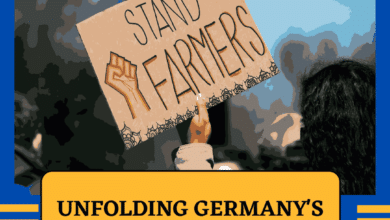Collapse of the German Government
Collapse of the German Government: What We Know So Far
The German government is in a state of political turmoil following a series of dramatic developments that led to the collapse of its coalition. This coalition, commonly known as the ‘traffic light’ coalition, was an alliance between the Social Democrats (SPD), the Greens, and the Free Democrats (FDP). The coalition fell apart after Chancellor Olaf Scholz made the shocking decision to fire Finance Minister Christian Lindner, citing an irrevocable breakdown in trust between them. This move has sparked calls for early elections and fueled widespread political instability in Germany.
Events Leading to the Collapse
Tensions within the coalition had been simmering for months, with frequent disagreements over economic policies. Lindner, as Finance Minister and leader of the pro-business FDP, repeatedly proposed sweeping economic reforms aimed at reviving Germany’s stagnant economy. However, the SPD and the Greens were opposed to many of Lindner’s policies, creating a deadlock. Chancellor Scholz’s decision to dismiss Lindner, despite ongoing crisis talks, marked the tipping point, as he felt Lindner’s refusal to cooperate was paralyzing the government. Scholz commented on Lindner’s dismissal, saying, “The finance minister shows no willingness to implement the offer for the good of our country. I do not want to subject our country to such behavior any more.” This remark underscored the depth of their discord and set in motion the end of the coalition.
Potential Early Elections
Originally, Germany’s next general election was scheduled for September 2025. However, in light of recent developments, it now appears that the nation could head to the polls much sooner. Scholz has indicated plans to call for a vote of confidence in January 2025, giving the German parliament a chance to reaffirm—or reject—his leadership. If he loses this confidence vote, Germany will be on track for early elections, possibly as soon as March.
Some conservative leaders, such as Friedrich Merz of the Christian Democratic Union (CDU), are pushing for an even swifter resolution. Merz has called on Scholz to hold the confidence vote immediately, arguing that prolonged political instability could harm the nation. “We simply cannot afford to have a government without a majority in Germany for several months,” Merz stated, pressing for a January election to quickly restore stability.
Calls for Immediate Action
Beyond Merz and the CDU, leaders from other political parties have echoed the need for rapid action. The far-right Alternative for Germany (AfD) has been particularly vocal, insisting that the government should not wait until next year. Alice Weidel and Tino Chrupalla, key figures within the AfD, issued a joint statement urging Scholz to step down and call an immediate vote of confidence to resolve the crisis. These leaders argue that Germany requires a capable government that can address its pressing economic and political issues without delay.
Resignations and New Appointments
Following Lindner’s dismissal, other prominent FDP members in Scholz’s cabinet announced their resignations as well, signaling a significant breakdown in party unity. Education Minister Bettina Stark-Watzinger and Justice Minister Marco Buschmann both resigned from their posts, aligning themselves with Lindner. However, not all FDP ministers followed suit. Transport Minister Volker Wissing, for example, made the surprising decision to remain in government, despite stepping down from his FDP membership. Wissing’s decision reflects a deepening rift within the FDP itself.
Meanwhile, Chancellor Scholz has moved quickly to appoint Jörg Kukies, a trusted ally from the SPD, as the new finance minister. Kukies’ appointment represents an effort by Scholz to stabilize his administration amidst the chaos, but it remains uncertain if these adjustments will be enough to restore public trust.
The Broader Context
Germany’s current political crisis could not have come at a more challenging time. Domestically, the nation is grappling with a sluggish economy and rising discontent among the public, while internationally, it faces growing pressures due to shifting alliances. The recent election of Donald Trump as U.S. president has introduced uncertainty regarding American support for European defense and Ukraine. This adds urgency for Germany to establish a strong, stable government that can navigate the increasingly volatile geopolitical landscape.
Political expert Kai Arzheimer commented on the situation, saying, “There is a major imperial land war going on in Europe, and it is highly likely that the incoming Trump administration will withdraw much of American support for Ukraine and Europe. Germany and Europe need a stable government in Berlin.” His words underscore the importance of effective leadership in Germany to respond to both domestic challenges and external pressures.
What Lies Ahead for Germany?
The collapse of Germany’s coalition government marks a pivotal moment in recent German history. As Scholz prepares for a confidence vote in January, the country could soon face one of the most significant elections in recent decades. The outcome of this vote, and any ensuing elections, will have far-reaching implications not only for Germany but also for the broader European region.
With the possibility of an early election, political analysts and leaders alike are watching closely to see whether the next German government will be able to bring much-needed stability and address the country’s pressing economic challenges. As Scholz seeks a fresh mandate, he faces a difficult road ahead in regaining public trust and reestablishing unity in a deeply divided political landscape.
Read More at How to Abroad
Everything that Changes in Germany in November 2024
Deutschlandticket to increase to 58 Euros per month Starting in 2025









